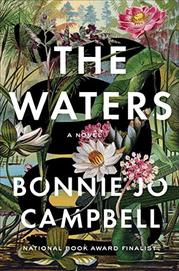A fairy-tale atmosphere coexists with harsh realities from the opening sentence: “Once upon a time M’sauga Island was the place where desperate mothers abandoned baby girls and where young women went seeking to prevent babies altogether.” The island is home to elderly Hermine “Herself” Zook, who fabricates medicines from wild plants that populate the wetlands separating the island from the town of Whiteheart, and her 11-year-old granddaughter, Donkey. The girl is nicknamed for the animal milk that nourished her as an infant after her mother, Rose Thorn, left her with Hermine. Rose was raped by Titus Clay Sr., the father of her true love, and chose flight over telling Titus Jr. She lives in California with her sister, Primrose, who broke up the Zook family by having an affair at 17 with Hermine’s husband, her adopted father. Women are not merely victims, and men are not only predators in Campbell’s complex portrait of rural society, which includes several scenes with a drunken chorus of local men displaying confusion over their place in the world—as well as an ongoing fascination with the beautiful Rose Thorn, who makes periodic appearances to unsettle poor Titus Jr. Third sister Molly, nurse at a nearby hospital, also drops by to proclaim the dangers of Hermine’s off-the-grid lifestyle and the urgent necessity of sending her niece to school. Donkey, more comfortable with math and animals than people, is torn between her desire for an education and loyalty to her grandmother, both revered and stigmatized by the locals who buy her potions but view her as more or less a witch. The wise woman privy to nature’s secrets has become an overused fictional trope, but it’s mitigated here by Campbell’s sharply drawn characters and her refusal to make easy judgments about them. A birth rather predictably reconciles the town’s men with the Zook women, but the new arrival does not solve everyone’s problems. Campbell’s thoughtfully rendered characters find life rewarding and bewildering in equal measures.

